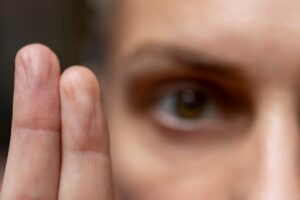Could EMDR therapy be the solution to your alcoholism? This is a question that many people are asking themselves lately. EMDR, which is short for Eye Movement Desensitization and Reprocessing, is a relatively new type of therapy. It has been shown to be very effective in treating a variety of mental health issues, including alcoholism. In this blog post, we will discuss what EMDR therapy is, how it works, and whether or not it could be the right treatment option for you!
Contents
What Is EMDR Therapy?
 EMDR (Eye Movement Desensitization and Reprocessing) therapy is a type of psychotherapy that was developed in the 1980s by psychologist Francine Shapiro. It combines elements of cognitive behavioral therapy with exposure therapy. That helps individuals confront their fears in order to reduce or eliminate them.
EMDR (Eye Movement Desensitization and Reprocessing) therapy is a type of psychotherapy that was developed in the 1980s by psychologist Francine Shapiro. It combines elements of cognitive behavioral therapy with exposure therapy. That helps individuals confront their fears in order to reduce or eliminate them.
The theory behind EMDR is that traumatic memories are stored in a person’s brain differently than normal memories. By using bilateral stimulation (such as eye movements, tapping, or sounds) the therapist helps to trigger these memories so they can be processed and released.
Through continued EMDR sessions, individuals can work through their past issues and move forward with healthier coping strategies. Therefore, if you may be struggling with unresolved trauma or anxiety, EMDR can be an effective and efficient treatment option.
Does EMDR Work For Alcoholism?
As the therapy is specifically designed for trauma and PTSD, it is not often used as a treatment for alcoholism. However, some believe that EMDR might be beneficial in treating the underlying issues of alcoholism. It can help uncover and process unresolved traumatic events that may have precipitated the problem of drinking.
The simple answer could be – Yes, it is somehow useful in treating alcoholism. However, more research needs to be done to determine if EMDR is an effective treatment for alcoholism specifically. But the main reason for its effectiveness is that it helps the alcoholics to process their unresolved traumatic events. So that they can free themselves from the issues that made them turn toward addiction.
Therapists combining EMDR and other techniques such as cognitive-behavioral therapy have seen some promising results. However, be sure to discuss it with a professional to get a customized and targeted treatment plan that is right for you.
What Are The Methods Involved In EMDR Therapy For Alcoholism?
 If you have opted for EMDR therapy for alcoholism, you will be asked to focus on certain aspects of your past, present, and future. In particular, you may be asked to identify traumatic events that have shaped your current drinking pattern or behaviors. Once these triggers are identified, the therapist will use a variety of methods in order to process them emotionally.
If you have opted for EMDR therapy for alcoholism, you will be asked to focus on certain aspects of your past, present, and future. In particular, you may be asked to identify traumatic events that have shaped your current drinking pattern or behaviors. Once these triggers are identified, the therapist will use a variety of methods in order to process them emotionally.
The core methods used by EMDR therapists include eye movements, which involve having the patient follow the therapist’s finger, light bar, or another stimulus. While focusing on traumatic memories. The therapist will also use tapping, where the patient is asked to tap certain body parts in response to certain images or memories.
Another method involves alternating bilateral sound stimulation (ABSS), which involves listening to either left or right-ear headphones. The patient will focus on the sounds and images that come up. And allowing them to process any associated feelings and emotions tied to the traumatic experience.
Finally, EMDR therapy for alcoholism may also involve an imagery-based approach, which utilizes visualization techniques. And it explores certain aspects of the traumatic experience in a safe, supportive environment. EMDR therapy can help you process and understand your drinking habits on an emotional level. As well as provide coping mechanisms to break cycles of addiction and trauma.
Who Is Not A Good Candidate For EMDR?
 While the vast majority of individuals can benefit from EMDR, there are certain situations in which it is not recommended. Here are a few examples:
While the vast majority of individuals can benefit from EMDR, there are certain situations in which it is not recommended. Here are a few examples:
- Individuals who are actively suicidal or homicidal.
- Individuals with psychosis, bipolar disorder, severe depression, or other mental conditions that have not been stabilized by medication and/or psychotherapy.
- Those who are overwhelmed by intrusive thoughts or memories that come up in the sessions.
- Individuals who are not able to form a trusting relationship with their therapist, or have difficulty following directions from their therapist.
- Those who are in a state of severe emotional distress and need more intense interventions.
- Individuals who are not willing or able to commit to the EMDR process.
- Those without adequate support in their lives, such as family and friends.
- Individuals with severe post-traumatic stress disorder (PTSD) who have not been stabilized by other treatments.
- Individuals who have not had a comprehensive mental health evaluation prior to engaging in EMDR.
- Those with significant cognitive deficits may interfere with their ability to participate fully in the EMDR process.
As you can see, the limitations or sort of people who are not good candidates for EMDR are quite specific. It is important to discuss your individual situation with a qualified mental health care provider in order to determine whether or not this treatment approach is right for you.
And it is important to remember that the chances of successful treatment are greatly increased if all of the necessary criteria for success have been met. If either you or your therapist feels as though EMDR may not be appropriate for your situation. Then, there are other treatments available that may prove to be effective.
What Is The Success Rate Of EMDR Therapy For Alcoholism?
Well, if you’re wondering what the success rate of EMDR therapy for alcoholism is, it really depends on several factors. To start, the patient has to have a genuine desire and commitment to change their drinking behavior.
That said, research does suggest that this form of treatment can be highly effective in helping individuals reduce or even eliminate their alcohol use altogether.
Generally, the duration of treatment is determined by the severity of a person’s alcohol use. On average, most people can expect to attend around 8-12 sessions over the course of 3-6 months. This range may vary depending on how motivated a person is and how well they are able to apply the techniques learned in therapy.
What Other Treatment Can Help With Alcoholism?
 As alcoholism is not just a physical but also a mental addiction, there are many treatments recommended for those trying to overcome their alcohol use disorder. While abstinence is still the gold standard of recovery from alcohol use disorder. There are other medications and therapies that may help people in recovery better manage the symptoms of withdrawal and cravings.
As alcoholism is not just a physical but also a mental addiction, there are many treatments recommended for those trying to overcome their alcohol use disorder. While abstinence is still the gold standard of recovery from alcohol use disorder. There are other medications and therapies that may help people in recovery better manage the symptoms of withdrawal and cravings.
Medications such as disulfiram (Antabuse), acamprosate (Campral), and naltrexone (Vivitrol) can help reduce alcohol cravings, decrease the pleasurable effects of alcohol, and make it easier for people to stay sober. Another medication, topiramate, has shown promise in reducing drinking as well as helping with other symptoms such as insomnia and depression.
In addition to medications, psychotherapy can be beneficial. Cognitive behavioral therapy (CBT) helps people identify triggers that lead them to drink and works on ways they can cope with stress and cravings without relying on alcohol.
Finally, some mindfulness and relaxation techniques can help people manage their cravings and feelings of anxiety when quitting alcohol. These techniques can include yoga and meditation, which both have been proven to reduce stress levels and help with focus.
Overall, there are many treatments available for those trying to cope with alcoholism. It is important for individuals to find the right combination that works best for them and their recovery journey.
Conclusion
In conclusion, EMDR therapy for alcoholism is an effective and evidence-based approach for individuals struggling with alcohol use disorder. By targeting the underlying causes of addiction, EMDR helps to reduce cravings, improve coping skills and increase overall self-efficacy in order to maintain sobriety. Additionally, this type of therapy allows the individual to heal from psychological trauma. That often accompanies alcoholism without having to re-experience the pain and distress associated with it.
This can be an invaluable tool in helping individuals or groups maintain successful long-term sobriety and improved quality of life. Ultimately, EMDR is a powerful tool that can help those suffering from alcoholism find lasting recovery.
For more information, please contact MantraCare. Addiction is a chronic and often relapsing disorder characterized by compulsive drug-seeking and use despite harmful consequences. If you have any queries regarding Online Addiction Counseling experienced therapists at MantraCare can help: Book a trial Online therapy session


